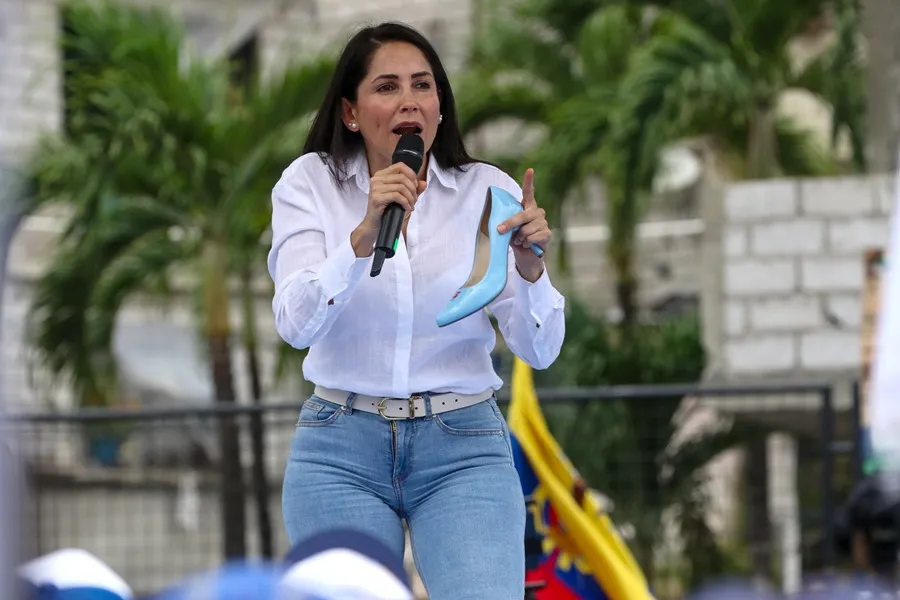International
Luisa González, Correa’s bishop who seeks revenge against Noboa

Luisa González, the bishop of the former president of Ecuador Rafael Correa (2007-2017), once again personifies the hope of the correismo to return to govern the country after eight years away from power and to be the first Ecuadorian woman to win a presidential election.
González (Quito, 1977), a lawyer with peasant roots on the Ecuadorian coast, was on the verge of achieving it in 2023, when she was surpassed in the second round of the extraordinary elections by the current president, Daniel Noboa, who now seeks his re-election and once again profiles himself as the greatest rival of the correísmo.
This 47-year-old single mother with two children, a woman of Correa’s absolute confidence, accepted the challenge of seeking her particular revenge and returning to being the candidate of the Citizen Revolution led by the former president, who is disqualified from being a candidate for the sentence of eight years in prison for bribery he received in 2020 and he considers “lawfare”.
Although he was born circumstantially in Quito when his parents visited the capital, González defines himself as an “authentic manaba”, originally from the coastal province of Manabí, where he grew up in Canuto, a lavish agricultural land where the “montubios” the tough peasants of the coast are also forged.
He worked in the field with his grandfather, who taught him to temper his character, to ride a horse, to handle the machete and perform the hard tasks entrusted to the mountaineer. Emerging from that rural and challenging environment, González proudly claims to be a woman who has managed to make herself and get her children ahead.
With a strong Catholic conviction, a crucifix hangs from González’ neck and on her skin she has tattooed pink paths since she was a twenty-year-old that symbolize her commitment to the Lord, one with a stem formed by the words of a fragment of the Bible.
His positions against the total decriminalization of abortion have also cost him criticism from leftist groups in his time as an assemblyman.
González studied at the International University of Ecuador, where she received a lawyer’s degree, but also has a master’s degree in Economics and Development at the Complutense University of Madrid.
He is a lover of Manabita cuisine, one of the most precious in Ecuador, as well as sports and animals, to the point that he has two dogs at home.
He was linked to Correísmo from the beginning, when Rafael Correa began his political life and quickly reached the Presidency of the Republic in 2007. She is faithful to the former president, of whom she was his coordinator of Strategic Agenda (2010), a key and close position that allowed her to understand the twists and turns of power.
She also served as Deputy Minister of Tourism Management (2014), Secretary General of the Presidential Office (2015) and National Secretary of Public Administration (2017).
She served as vice-consul of Ecuador in Madrid (2011) and consul in Alicante (Spain) in 2017, as well as general secretary of the Intendencia de Compañías de Quito.
After concluding Correa’s mandate in 2017, she launched into active political life and in 2021 she was elected as a member of the National Assembly (Parliament), where she held a strong critical position against the Government of conservative President Guillermo Lasso (2021-2023), whose early departure led to the extraordinary elections of 2023.
His name began to sound just after Lasso invoked the so-called “cross death”, a constitutional mechanism that allowed him to dissolve Parliament and call new elections to complete the period that did not end (2021-2025).
After the 2023 elections, she remained as the president of the Citizen Revolution, which gave her strength to be the presidential candidate again against other possible candidates of the Correísmo such as Paola Pabón, Augusto Verduga and Gustavo Jalkh.
On this occasion he accompanies González as a candidate for vice president Diego Borja, instead of Andrés Arauz, who was the presidential candidate of the correísmo in 2021.
The Citizen Revolution appeals to the stability enjoyed by Ecuador during the decade that Correa ruled the country, which the presidential candidate wants to “revive”, as she repeatedly mentions in her campaign interventions, which happens to a large extent by appeasing the crisis of violence that affects the country due to the rise of organized crime gangs.
International
Florida judge sets 2027 trial in Trump’s $10 billion lawsuit against BBC

A federal judge in Florida has scheduled February 2027 for the trial in the lawsuit filed by U.S. President Donald Trump against the BBC, in which he is seeking $10 billion in damages for defamation.
Trump accuses the British broadcaster of airing a misleading edit of a speech he delivered on January 6, 2021, which, he says, made it appear that he explicitly urged his supporters to attack the U.S. Capitol in Washington.
The president filed the suit in December in federal court in Florida, alleging defamation and violations of a law governing business practices when the program was broadcast ahead of the 2024 election.
Trump is seeking $5 billion in damages for each of the two claims.
Lawyers for the BBC unsuccessfully asked the court to dismiss the case, arguing that Trump had not suffered a “legally recognizable harm,” since the investigative program Panorama, which included the edited footage, aired outside the United States.
International
Head-of-state diplomacy key to guiding China–U.S. ties, Beijing says

Head-of-state diplomacy plays an irreplaceable strategic guiding role in China–United States relations, Chinese Foreign Ministry spokesperson Lin Jian said on Thursday during a regular press briefing, when asked about high-level exchanges between the two sides.
Lin added that in a recent phone call, U.S. President Donald Trump once again expressed his intention to visit China in April, while Chinese President Xi Jinping reiterated his invitation.
Both sides remain in communication regarding the matter, the spokesperson said.
Lin noted that the essence of China–U.S. economic and trade ties lies in mutual benefit and win-win outcomes.
“Both parties should work together to implement the important consensus reached by the two heads of state, injecting greater certainty and stability into China–U.S. economic and trade cooperation, as well as into the global economy,” he said.
International
Trump administration to end special immigration operation in Minnesota

The administration of Donald Trump is bringing to a close its special operation targeting illegal immigration in the northern state of Minnesota, border czar Tom Homan announced Thursday, following weeks of unrest and the fatal shootings of two activists by federal agents.
Thousands of federal officers had been deployed to Minnesota in December to carry out large-scale raids against undocumented immigrants.
The operations triggered strong reactions from residents and advocacy groups, leading to daily confrontations and the deaths of two people who were shot by federal agents.
“I proposed, and President Trump agreed, that this special operation should end in Minnesota,” Homan said during a press conference in the state capital, Minneapolis.
“A significant drawdown began this week and will continue into next week,” he added.
Homan indicated that similar enforcement efforts could be launched in other cities.
“Next week we will redeploy the agents currently here back to their home stations or to other parts of the country where they are needed. But we will continue to enforce immigration laws,” he said.
-

 Central America4 days ago
Central America4 days agoGuatemala isolates Barrio 18 leader after attacks that killed 11 police
-

 Sports5 days ago
Sports5 days agoShakira ignites El Salvador with near sold-out residency at Mágico González Stadium
-

 International2 days ago
International2 days agoU.S. Health Department says CDC grants no longer match agency priorities
-

 International1 day ago
International1 day agoOver 50 Civil Groups Urge House to Impeach DHS Secretary Kristi Noem
-

 International2 days ago
International2 days agoICE Arrests Reach 379,000 Under Trump, Testimony Shows Amid Minnesota Shootings
-

 Central America1 day ago
Central America1 day agoGuatemala to Phase Out Longstanding Medical Cooperation Agreement with Cuba
-

 International2 days ago
International2 days agoDespite homicide drop, overall deadly violence remains high in Mexico: study
-

 International2 days ago
International2 days agoSheinbaum Urges Mexico to ‘Jealously’ Guard Sovereignty at Air Force Anniversary
-

 International2 days ago
International2 days agoMEPs Approve Plan That Could Fast-Track Rejection of Some Asylum Claims
-

 International2 days ago
International2 days agoJet Fuel Crisis Hits Cuba: Flights Disrupted, Air Canada Cancels Services
-

 International1 day ago
International1 day agoNew York’s New Archbishop Names Óscar Romero as His Favorite Saint
-

 International2 days ago
International2 days agoMexico Rises Slightly to 141st in Global Corruption Perceptions Index 2025
-

 International4 hours ago
International4 hours agoFlorida judge sets 2027 trial in Trump’s $10 billion lawsuit against BBC
-

 International4 hours ago
International4 hours agoHead-of-state diplomacy key to guiding China–U.S. ties, Beijing says
-

 International4 hours ago
International4 hours agoTrump administration to end special immigration operation in Minnesota
-

 International1 day ago
International1 day agoExclusive Tucson Neighborhood Shaken by Disappearance of Savannah Guthrie’s Mother
-

 International2 days ago
International2 days agoChile Unveils Latam-GPT to Give Latin America Its Own AI Model


























